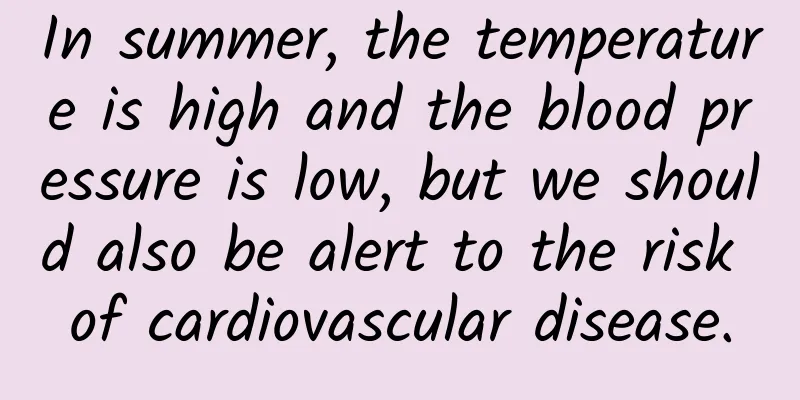In summer, the temperature is high and the blood pressure is low, but we should also be alert to the risk of cardiovascular disease.

|
As summer approaches, many places have turned on the high temperature mode. A friend asked Huazi, when the temperature rises, blood pressure drops, is it more beneficial for cardiovascular and cerebrovascular diseases? Hua Zi said that although lowering blood pressure can protect the cardiovascular system, high temperatures in summer can increase the risk of cardiovascular disease. In the Journal of Environment and Health, there is a case-crossover study on the relationship between daily maximum temperature and emergency visits to hospitals for cardiovascular and cerebrovascular diseases, which points out that when the temperature exceeds 30°C, the number of patients with cardiovascular and cerebrovascular diseases will increase by 17.3% for every 1°C increase in the maximum temperature. 1. Blood pressure will be low in summer The human body's blood pressure fluctuates with the seasons. When the temperature rises in summer, blood pressure tends to be lower than in winter. This is due to two reasons. First, when the temperature rises, the blood vessels on the surface of the body dilate, which causes a decrease in blood pressure. Second, the amount of sweating increases, and a large amount of sodium ions are discharged with sweat, which also causes a decrease in blood pressure. Therefore, people with high blood pressure should pay attention to monitoring their blood pressure and adjust their antihypertensive drugs according to the fluctuation of blood pressure. If the blood pressure is lower than 110/60 mmHg for more than two weeks, it is recommended to reduce the dose of antihypertensive drugs to avoid insufficient blood supply to important organs such as the heart, brain, and kidneys due to low blood pressure. When the temperature turns cooler in autumn and winter and the blood pressure rises, the normal dose of antihypertensive drugs can be resumed. 2. Pay attention to proper water supplementation In summer, the human body sweats more, which causes a large loss of body fluids and reduces blood volume. Although blood pressure will decrease, excessive dehydration will increase blood viscosity and slow blood flow, which may increase the risk of blood clotting. The elderly are not sensitive to thirst, and if they do not replenish water in time, they will increase the risk of blood clots. If you replenish water too quickly in a short period of time, it will cause a sudden increase in blood volume, increase the burden on the heart, and easily lead to cardiovascular risks. Therefore, drinking in large gulps is not advisable. The correct way to replenish water is to drink slowly in small sips. It is recommended to replenish about 2000ml of water every day, divided into 10 portions, drink a few sips every 1 hour, and finish it within a day. 3. Regular work and rest schedule to control emotions Studies have found that in summer, blood pressure only decreases during the day, while it tends to increase at night. This may be because the long days and short nights and hot temperatures in summer affect sleep. Lack of sleep will lead to sympathetic nerve activation, faster heart rate, vasoconstriction, and large fluctuations in blood pressure. Hot temperatures can also make people irritable and angry, and can also activate the sympathetic nervous system. Therefore, in summer, it is even more important to maintain a regular schedule and get enough sleep. If the temperature is too high, you can use air conditioning to cool it down, but the temperature difference between indoors and outdoors should be controlled within 5°C. If you use a fan, be careful to avoid direct blowing. 4. Go to bed late, get up late, and exercise in the evening In summer, the sun rises early, and many elderly people are used to getting up early to exercise, getting up at 3 or 4 in the morning. Huazi does not recommend morning exercises for the elderly, because the human body's blood pressure has a natural rhythm and usually reaches its highest in the early morning, also known as "morning peak blood pressure". Early morning is also the time when cardiovascular diseases are most likely to occur. Blood pressure will also rise during exercise, and when combined with the "morning peak blood pressure", it will significantly increase the risk of cardiovascular disease. Therefore, it is not recommended for the elderly to get up too early to exercise, and they can go to bed late and get up late. Don't exercise immediately after getting up, as the temperature is too hot at noon. It is more reasonable to exercise in the evening, one hour after dinner. 5. Ensure nutritional balance High temperatures in summer can make people's appetite worse, so the elderly should pay attention to a reasonable diet and not eat too little because of the heat. Otherwise, the body may not get enough nutrition, which may cause heart and nerve dysfunction and increase cardiovascular risks. There is an adequate supply of fresh vegetables and fruits in summer, so you can eat more of them, reduce the intake of staple foods such as refined rice and noodles, and pair them with lean meat, seafood, dairy products, beans, coarse grains and other foods. People with digestive system diseases or heart diseases should avoid eating cold drinks such as popsicles and ice cream. Excessively cold food not only irritates the digestive tract, but may also irritate the heart adjacent to the stomach, increasing the risk of cardiovascular disease. To sum up, in the hot summer, the human body's blood pressure will decrease, but it does not mean that the cardiovascular risk will also decrease. When the maximum temperature exceeds 30℃, the cardiovascular risk will increase with the temperature. Elderly friends should master relevant health knowledge to prevent cardiovascular risks. I am pharmacist Huazi, welcome to follow me and share more health knowledge. |
Recommend
Menstruation is delayed for two days and leucorrhea increases
For every adult woman, menstruation has a certain...
Normal value of gestational sac at 42 days of pregnancy
Pregnancy at 42 days is still a dangerous period....
What should you pay attention to during the confinement period after childbirth?
It is not easy for a woman to get pregnant, and i...
As the Great Heat arrives, what should you pay attention to in order to maintain your health?
Today is July 22, 2024. Monday, June 17, Jiachen ...
Who is prone to ovulation bleeding?
For a woman, there is a normal shedding of the ut...
How can women nourish the kidneys effectively?
Having a good kidney is vital for us. Both men an...
Six habits to improve your private health
A healthy and independent woman can attract the a...
How to exercise women's pectoralis major muscles?
Perfect muscles are only a sign of physical fitne...
The best time to sleep has been revealed. Do you sleep during this time period?
The best time to sleep has been revealed. Do you ...
What is tubal ligation
Tubal ligation is a type of sterilization surgery...
Is the cloud bamboo bonsai easy to maintain? How does the cloud bamboo bonsai grow vigorously?
Cloud bamboo is a plant that is often seen in lif...
What to do if your breasts sag
As many women age, their skin becomes loose to va...
Can steamed sea bass be eaten overnight? When is the best season to eat Songjiang sea bass?
Sea bass is a kind of fish that lives in the coas...
What are the symptoms of miscarriage?
For many people who have an unexpected pregnancy ...
Eating white meat has become a fashion, but is it really healthier and safer?
A few days ago, I was having dinner with a friend...









